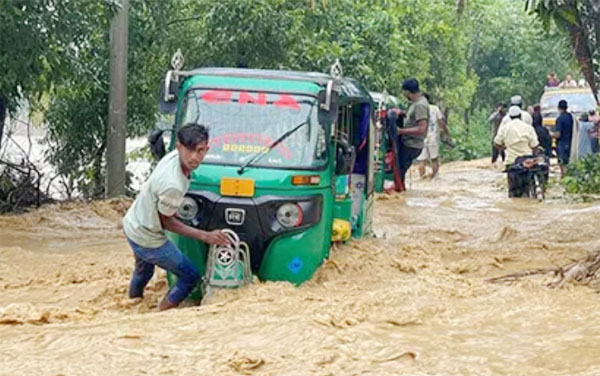News Desk : dhakamirror.com
Fifty-nine people, including 41 men, six women and 12 children, died in the devastating flood as deaths of five more people were reported on Saturday.
So far, 14 deaths have been reported in Cumilla, six in Chattogram, 23 in Feni, nine in Noakhali, three in Cox’s Bazar, and one each in Brahmanbaria, Khagrachhari, Moulvibazar, and Lakshmipur.
The floods have severely impacted 54,57,702 people across 504 municipalities and unions in these districts, according to the Ministry of Disaster Management and Relief.
The situation has stabilised in Chattogram, Habiganj, Sylhet, Cox’s Bazar, and Khagrachhari, while conditions are gradually improving in Moulvibazar, Brahmanbaria, Cumilla, Feni, Noakhali, and Lakshmipur.
However, vast areas remain submerged, and recovery efforts are ongoing.
Authorities are racing to provide essential aid to over 6,96,995 stranded families across 68 upazilas.
Approximately 3,93,305 people have taken refuge in 3,928 relief centres, where over 600 medical teams are deployed, reports agencies.
Concerns are growing over a potential outbreak of waterborne diseases, with 3,000 people already hospitalised in the past 24 hours, according to officials.
“The urgent need for clean drinking water and medical care is critical to prevent a health crisis,” a disaster management ministry official said.
The Bangladesh Meteorological Department has warned of continued flooding due to persistent monsoon rains.
With many areas still submerged, agricultural damage poses a significant threat to food security.
The UN children’s agency, Unicef, warns that two million children are at risk due to the floods, the worst the region has seen in three decades and is urgently appealing for $35 million to provide life-saving supplies.
Emma Brigham, deputy representative of Unicef Bangladesh, underscored the devastating impact of climate change on children, while Farah Kabir, director of ActionAid Bangladesh, called for international support to help the country recover from climate-related losses.
Farah Kabir stressed the need for urgent funding to build resilience against future climate impacts, particularly for nations like Bangladesh that contribute minimally to global emissions.
The government has allocated Tk4.52 crore in relief funds to the affected districts, along with 20,650 tonnes of rice, 15,000 pieces of dry foods, and Tk35 lakh each for baby food and animal fodder.
As floodwaters gradually recede, some displaced residents have started returning home, though many remain in shelters.
The authorities have been urged to take preventive measures against the outbreak of waterborne diseases in affected areas.
Rohingya refugees provide relief to flood victims
In a show of solidarity, Rohingya refugees from the Kutupalong Camp have provided humanitarian aid to around 3,000 families in Feni, Noakhali, Lakshmipur, and Cumilla.
A team of refugees collected essential supplies, including rice, lentils, cash, and various food items, for distribution in the flood-affected areas.
Rohingyas, who have been displaced from Myanmar for over three decades, are committed to supporting the Bangladeshi people in their time of need, said Arman Ilahi and Saydul Huq, organisers from the Ukhiya Kutupalong Refugee Community.
However, the Refugee Relief and Repatriation Commissioner Mohammad Mizanur Rahman, clarified that the Rohingya team did not seek prior permission before leaving the camp to distribute relief.
He underscored that government intelligence agencies and relevant authorities have been informed of their activities.
As the flood recovery continues, both local and international efforts are being mobilised to aid affected communities and ensure a swift return to normalcy while preventing further crises in the coming days.
– Input from TBS was used in this article.





















